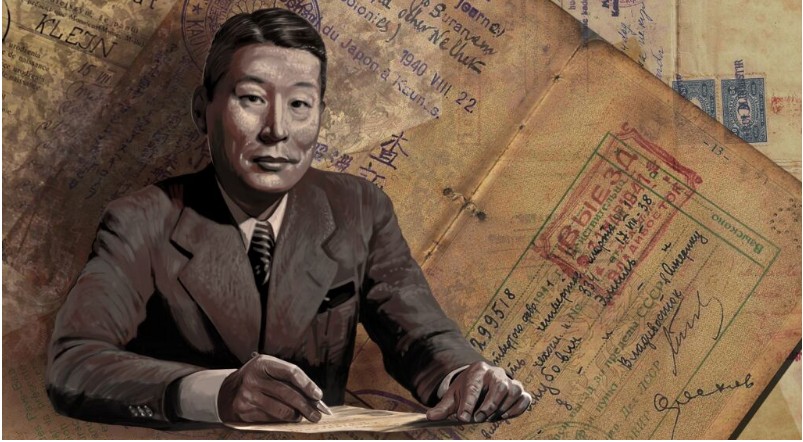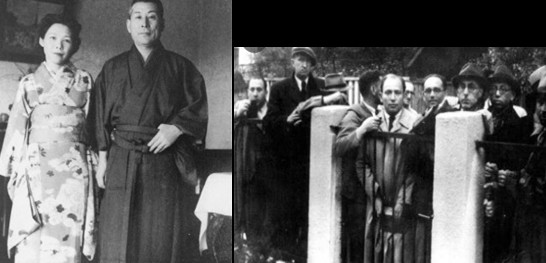|

Conspiracy of kindness
|
During the second world Japanese diplomat Chiune Sugihara saved thousands of lives by issuing visas to Jewish refugees in Lithuania.
The Nazis had conquered much of Western Europe. The rest of the free world, with few exceptions, had stopped accepting Jewish refugees from Lithuania or from regions controlled by Nazis. The greater threat to Jews in the country was from the German armies. They were advancing towards Lithuania.
Following the German invasion of Poland on September 1, 1939 hundreds of thousands of Jews and other Polish citizens fled eastward ahead of the advancing German army; many refugees found at least temporary safety in Lithuania. Options for escape were limited and required diplomatic visas to cross international borders. One route was through Asia using a combination of permits issued by foreign envoys responding to the refugee crisis: a bogus visa for entrance to the Dutch Caribbean island of
|
|
Curaçao and a visa for transit through Japan. Japanese Imperial Consul Chiune Sugihara, was the first Japanese diplomat posted in Lithuania. In August 1940, Sugihara sought instructions from his foreign ministry. He was told not to issue visas to anyone without proper papers, ruling out almost everyone in the queue. aking another request to Tokyo, he was told not to ask again.
In the absence of clear instructions from his government in Tokyo, Sugihara was trapped between his duty and his principles. He had to choose between obeying his government and obeying his consciousness. The 40-year-old consul knew this was the biggest decision he had ever had to make.
He decided to issue visas anyway. Over 6 weeks in July & August, he worked 18 hours days, eventually writing out by hand 2,139 visas, a record discovered only after years.
Sugihara granted 10-day visas to Japan to thousands of refugees who held
|
|
|
Then, the Foreign Ministry reported that individuals with visas headed for the United States and Canada had arrived in Japan without money or final destination visas. In his response, Sugihara admitted to issuing visas to people who had not completed all arrangements for destination visas explaining that Japan was the only transit country available for going in the direction of the United States, and his visas were needed to leave the Soviet Union. By the time the Soviets ordered all diplomatic consulates closed.
He saved 6,000 jews by issuing visas for Jewish refugees to travel to Japan.
After they had been writing visas for about a week, Soviet authorities instructed all foreign embassies to immediately leave Lithuania. But Sugihara put in a special request for a 20-day extension. To his surprise and relief, the Soviets granted it. And the Sugiharas made good use of those 20 days.
The Jewish Virtual Library says Sugihara slept very little during this time, and that he did not even stop for meals: “From July 31 to August 28, 1940, Mr. and Mrs. Sugihara sat for endless hours writing and signing visas by hand. Hour after hour, day after day, they wrote and signed visas. … Yukiko, his elder son also helped him register these visas. At the end of the day Sugihara's wife would massage his fatigued hands. He did not even stop to eat. His wife supplied him with sandwiches.
|
|
Sugihara chose not to lose a minute because people were standing in line in front of his consulate day and night for these visas.”
Sugihara lost weight and became profoundly exhausted, but he knew the Jews in the line were entirely at his mercy. So he kept on writing. He makes use of every second -
When the extension period came to an end, the Sugiharas had to board the train and leave Lithuania. As the train sat in the station before departing, Sugihara kept writing the documents and handing them out the window to Jews on the platform below.
As the train began rolling away, Sugihara extended himself halfway out of the window, and said to the crowd: “Please forgive me. I cannot write anymore. I will pray for your safety.” With tears streaming down his face, Sugihara bowed to the Jews on the platform, in a typical Japanese gesture of submissiveness. Reports say that the Jews called out, saying they would never forget him.
Years later, Sugihara’s son Nobuki asked his father about his heroic act, his father replied, “I just pitied them. No great reason”
Historian Simonas Strelcovas says, Sugihara’s story is “a kind of bright light” for Lithuania, who has written a book about the Japanese diplomat and the refugees who fled to Lithuania.l
|

|
|
|
|
